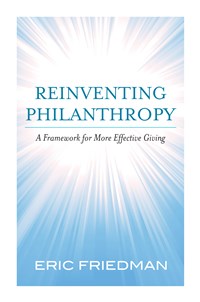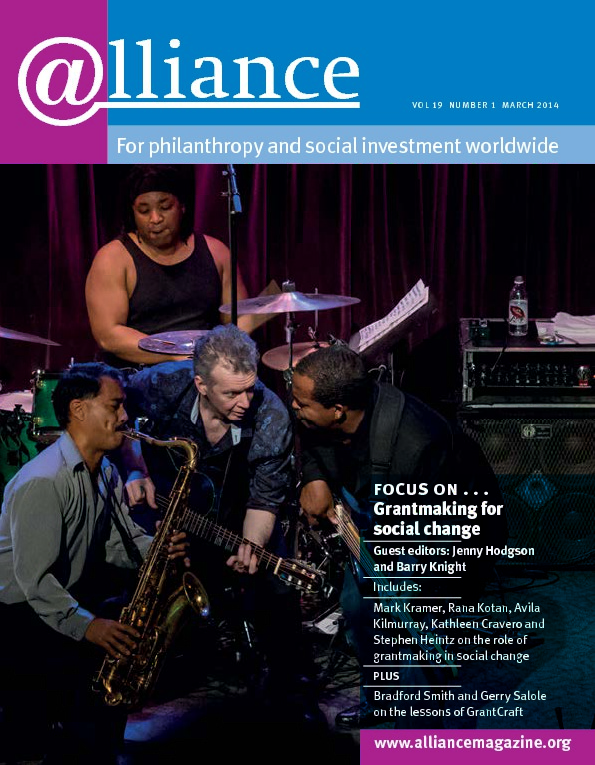One wonders how long after the invention of the concept of philanthropy there was a call to reform and reinvent it. It can’t have been long ‒ Maimonides wrote a guide to better giving in the 1100s. The goals of efforts to reform philanthropy vary widely: professionalizing the practice, de-professionalizing the practice, increasing diversity, increasing attention to social justice, safeguarding donor intent. The most common theme of all is arguably increasing the effectiveness of philanthropy. It’s a thread that runs through, at varying levels, organizations from Charity Navigator, Guidestar and GiveWell (where I serve on the board of directors) to the Gates and Hewlett Foundations, to Alliance magazine itself. And there are lots of books on this theme from authors like Peter Frumkin, Joel Fleishman, Paul Brest, Ken Stern and Peter Singer.
 This new book in the genre stands out for two reasons. First, Friedman is an individual donor, not a billionaire philanthropist, professional or academic in the field; second, unlike many efforts in the space, Friedman points the finger squarely at donor motivations.
This new book in the genre stands out for two reasons. First, Friedman is an individual donor, not a billionaire philanthropist, professional or academic in the field; second, unlike many efforts in the space, Friedman points the finger squarely at donor motivations.
While Friedman is certainly wealthy by global standards, he is not the sort of donor one is used to reading advice from. He hasn’t created a billion-dollar foundation, or even a foundation at all as far as I can tell. He is an actuary, living and working outside of Chicago, but one who has devoted an extraordinary amount of time to finding the best places to give. Without the help of a professional staff or an institution, finding information on where to give is quite difficult (though markedly easier than, say, 20 years ago). Much of the book details his search through the limited resources available to an individual donor. I should note that he dwells considerably on GiveWell and cites work I have done on improving the charity evaluation process ‒ however, I was unaware of Mr Friedman until asked to review the book.
What truly sets the book apart, however, is that Friedman’s first order priority is not on finding the ‘best’ charities but on identifying the ‘best’ causes. He argues that it is impossible to call a charity highly effective if it is not focused on an issue where there is both great need and great opportunity to make progress. He challenges directly the idea that giving to a well-endowed university is in any way on a par with giving to prevent the permanent intellectual stunting of a child from worm infections or malnutrition. He takes to task those in the philanthro-industrial complex who argue that all causes are essentially equal.
But unlike Peter Buffett’s recent screed, Friedman’s primary target is not the establishment but donors themselves. It is wonderfully refreshing to read a sentence as direct as: ‘Most individual donors are actually quite bad at giving.’ In this regard, his book is somewhat mistitled. ‘Reinventing Donors’ would perhaps be more apt. The idea that donors should give to the causes that make them feel good (and by extension to the charities that help them feel good as well) rather than giving to the causes where the most good can be accomplished is at the heart of the problems of philanthropy, and always has been. It is the main point of Maimonides’ 1,000-year-old treatise on the subject.
The rub is whether reinventing donors is possible. Even I, who have been an active participant in efforts to improve the practice of philanthropy on these same lines, subconsciously recoil when Friedman points out the cost-effectiveness difference between funding guide dogs in the developed world and treating onchocerciasis, a major cause of blindness in the developing world. The first costs thousands of dollars, the latter just a few. While my rational side fully accepts this argument, I have a son who will lose his vision before he is 20 and will likely benefit greatly from having a guide dog. And so I inwardly quail at the thought of all those funds being redirected.
Putting my emotional discomfort and scepticism about the likelihood of changing donor preferences aside, Reinventing Philanthropy embodies a necessary challenge to the status quo among donors. Systemic change in the sector must start with those who truly hold the power.
About the book
Published by: Potomac Books
Price: $27.50/£17.99
ISBN: 9781612345727
To order: http://www.reinventingphilanthropy.com
Timothy Ogden is managing director of the Financial Access Initiative at New York University and a contributing editor to Alliance. Email timothy.ogden@sonapartners.com



Comments (0)